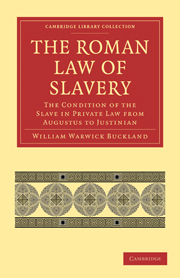Book contents
- Frontmatter
- PREFACE
- Contents
- ERRATA, ADDENDA, AND LIST OF ABBREVIATIONS
- LIST OF PRINCIPAL ABBREVIATIONS
- PART I CONDITION OF THE SLAVE
- PART II ENSLAVEMENT AND RELEASE FROM SLAVERY
- CHAPTER XVII Enslavement
- CHAPTER XVIII Enslavement (cont.)
- CHAPTER XIX Outline of Law of Manumission during the Republic
- CHAPTER XX Manumission during the Empire. Forms
- CHAPTER XXI Manumission during the Empire (cont.). Manumission by Will (cont.). Dies, Conditio, Institutio
- CHAPTER XXII Manumission during the Empire (cont.). Fideicommissary Gifts
- CHAPTER XXIII Manumission during the Empire (cont.). Statutory Changes
- CHAPTER XXIV Manumission under Justinian
- CHAPTER XXV Manumission. Special Cases and Minor Restrictions
- CHAPTER XXVI Freedom independent of Manumission
- CHAPTER XXVII Freedom without Manumission. Uncompleted Manumission
- CHAPTER XXVIII Questions of Status as affected by Lapse of Time, Death, Judicial Decision, etc.
- CHAPTER XXIX Effect after Manumission of Events during Slavery. Obligatio Naturalis
- APPENDIX I The relation of the contractual actions adiectitiae qualitatis to the Theory of Representation
- APPENDIX II Formulation and Litis Consumptio in the actions adiectitiae qualitatis
- APPENDIX III Form used by Slave in acquisition by Mancipatio, etc.
- APPENDIX IV The essential character of Manumission: Iteratio
- APPENDIX V Manumission vindicta by a, filiusfamilias
- INDEX
CHAPTER XXIII - Manumission during the Empire (cont.). Statutory Changes
Published online by Cambridge University Press: 07 September 2010
- Frontmatter
- PREFACE
- Contents
- ERRATA, ADDENDA, AND LIST OF ABBREVIATIONS
- LIST OF PRINCIPAL ABBREVIATIONS
- PART I CONDITION OF THE SLAVE
- PART II ENSLAVEMENT AND RELEASE FROM SLAVERY
- CHAPTER XVII Enslavement
- CHAPTER XVIII Enslavement (cont.)
- CHAPTER XIX Outline of Law of Manumission during the Republic
- CHAPTER XX Manumission during the Empire. Forms
- CHAPTER XXI Manumission during the Empire (cont.). Manumission by Will (cont.). Dies, Conditio, Institutio
- CHAPTER XXII Manumission during the Empire (cont.). Fideicommissary Gifts
- CHAPTER XXIII Manumission during the Empire (cont.). Statutory Changes
- CHAPTER XXIV Manumission under Justinian
- CHAPTER XXV Manumission. Special Cases and Minor Restrictions
- CHAPTER XXVI Freedom independent of Manumission
- CHAPTER XXVII Freedom without Manumission. Uncompleted Manumission
- CHAPTER XXVIII Questions of Status as affected by Lapse of Time, Death, Judicial Decision, etc.
- CHAPTER XXIX Effect after Manumission of Events during Slavery. Obligatio Naturalis
- APPENDIX I The relation of the contractual actions adiectitiae qualitatis to the Theory of Representation
- APPENDIX II Formulation and Litis Consumptio in the actions adiectitiae qualitatis
- APPENDIX III Form used by Slave in acquisition by Mancipatio, etc.
- APPENDIX IV The essential character of Manumission: Iteratio
- APPENDIX V Manumission vindicta by a, filiusfamilias
- INDEX
Summary
Of these three statutes the first mentioned, perhaps the last in date, was essentially different in object from the others. It enlarged existing rights: they were restrictive. For this reason, and because some of the provisions of the lex Aelia Sentia seem to presuppose the lex Iunia, it is well to deal with this law first.
Lex Iunia.
This statute defined the position of those who had been in libertate tuitione praetoris by the earlier law. It made them latins, giving them broadly the position of colonary latins, subject to certain disabilities of a very serious kind. Because of these restrictions they were called Latini Iuniani to mark them off from the others. The cases with which it dealt were, apparently, the slave freed by his bonitary owner, the slave informally freed, and the slave freed under 30, though as to this case we shall see that there is doubt as to what is due to this lex and what to the lex Aelia Sentia. Most of the points of difficulty under this lex will be more conveniently discussed later: here it is enough to mention a few points.
Notwithstanding the language of Gaius it is clear that a bonitary owner could give freedom by will. It is hardly so clear whether he could do it vindicta. And it seems that manumission censu must have given civitas or nothing. Apparently the entry of the man's name must have been a nullity, of no more force than any other mistake of the Censor's. And it does not seem that it amounted in itself to a manumission inter amicos or per epistolam.
- Type
- Chapter
- Information
- The Roman Law of SlaveryThe Condition of the Slave in Private Law from Augustus to Justinian, pp. 533 - 551Publisher: Cambridge University PressPrint publication year: 2010First published in: 1908



